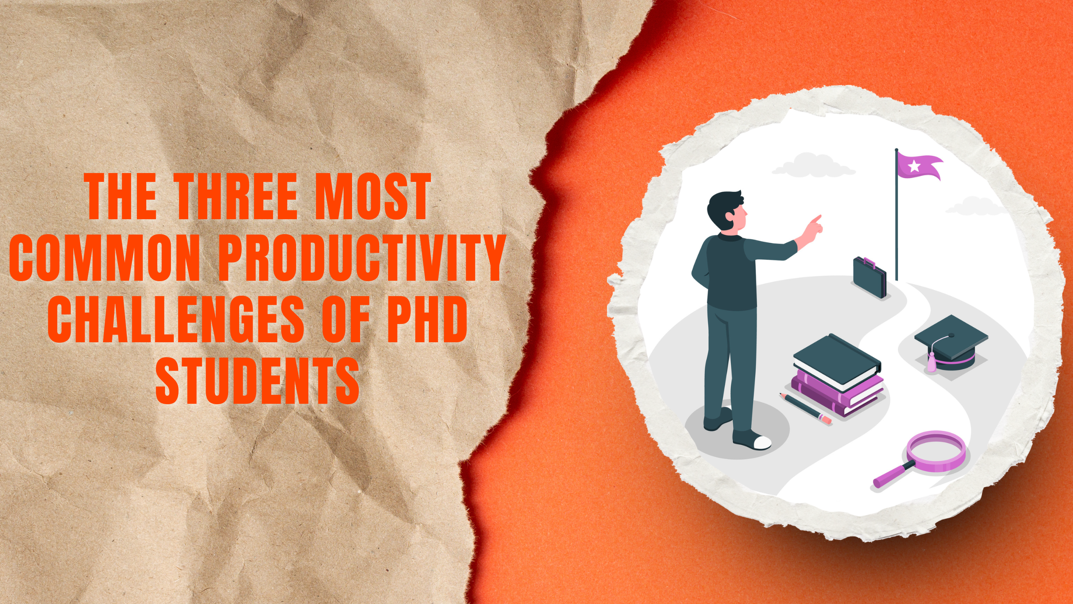The Three Most Common Productivity Challenges of PhD Students
Kenfra Research - Shallo2025-04-09T11:00:21+05:30Pursuing a PhD is a rewarding yet demanding journey. It requires intense dedication, time management, and the ability to remain motivated despite numerous setbacks. Many challenges of PhD students stem from issues that affect their productivity, which can slow down progress or even lead to burnout. Understanding the challenges of PhD students is the first step in overcoming them. In this article, we’ll explore the three most common productivity challenges of PhD students, delve into why they occur, and provide actionable strategies to help you stay on track.

Why Productivity Matters During a PhD
PhD programs are inherently self-directed. Unlike undergraduate or even master’s programs, doctoral studies require students to set their own timelines, plan their research, and produce original contributions to their field. Because of this independence, productivity directly affects how efficiently you can progress through your research, publish papers, complete your dissertation, and eventually graduate.
Now, let’s examine the top three productivity challenges that most PhD students encounter.
1. Lack of Structure and Time Management
The Challenge:
Unlike structured academic courses, PhD research lacks a clear daily routine. Without fixed deadlines (apart from broad submission milestones), students often find themselves procrastinating or working in an unstructured way. This lack of routine can lead to unproductive weeks or months, especially during the initial stages of the program.
Why It Happens:
- Research is open-ended, and the next steps aren’t always clear.
- Students often juggle multiple responsibilities: teaching, coursework, family, or part-time jobs.
- Supervisors may offer minimal guidance on time management.
The Solution:
- Create a Daily Schedule: Break your day into chunks and assign tasks to each block. Use productivity tools like Google Calendar, Notion, or Trello to visually plan your day.
- Set Micro-Deadlines: Divide your thesis or research tasks into smaller parts with weekly goals. For example, instead of “write literature review,” set goals like “summarize five articles by Friday.”
- Use Time Management Techniques: The Pomodoro Technique (25 minutes work, 5 minutes break) can enhance focus. Alternatively, try time-blocking or deep work sessions to improve concentration.
- Weekly Reviews: Spend 30 minutes each weekend reviewing your progress and planning the week ahead. This helps you stay aligned with your long-term goals.
2. Procrastination and Perfectionism
The Challenge:
Procrastination is a well-known problem for PhD students. Whether it’s delaying writing, putting off reading journal articles, or avoiding data analysis, many students fall into the trap of “I’ll do it tomorrow.” This often stems from the pressure to produce perfect work, leading to avoidance altogether.
Why It Happens:
- Fear of failure or rejection (especially in publishing).
- Belief that you need more knowledge before starting a task.
- Mental exhaustion and burnout.
- The never-ending loop of trying to make your work “perfect.”
The Solution:
- Focus on Progress, Not Perfection: Adopt the mindset that a rough draft is better than no draft. Writing can always be edited, but blank pages can’t be improved.
- Set the Timer and Start Anyway: Start with just 10 minutes of focused work. Often, the biggest hurdle is beginning. Once you start, momentum builds naturally.
- Reward Yourself: Incentivize your productivity. After completing a task, take a break, treat yourself, or engage in something fun.
- Track Your Wins: Keep a log of small achievements, whether it’s finishing a chapter, presenting at a conference, or learning a new method. This reinforces progress and builds confidence.
3. Isolation and Lack of Motivation
The Challenge:
Doctoral research can be a lonely path. Many PhD students feel isolated, especially when working remotely or in a small department. The solitude can make it hard to stay motivated, especially during difficult phases like data collection or thesis writing.
Why It Happens:
- Limited peer interaction or support.
- Long-term goals without immediate feedback.
- Few external motivators or recognition.
- Emotional challenges like imposter syndrome or anxiety.
The Solution:
- Join Peer Groups: Engage in academic writing groups, journal clubs, or local study groups. Platforms like ResearchGate, Slack communities, and Discord servers can also help you find accountability partners.
- Communicate with Your Supervisor: Don’t suffer in silence. Regular check-ins can help realign your research path and provide motivation. If you’re struggling emotionally, be honest about your challenges.
- Find Your “Why”: Reconnect with the original reason you started your PhD. Is it passion for your subject? A goal of teaching or contributing to knowledge? Remind yourself of your purpose often.
- Practice Self-Care: Prioritize sleep, nutrition, exercise, and downtime. A healthy body supports a focused mind. Meditation, mindfulness, or journaling can also help regulate emotions.
Bonus Tips for Improving PhD Productivity
- Digital Detox: Reduce distractions by blocking social media or unnecessary websites using apps like Freedom or Cold Turkey.
- Declutter Your Workspace: A clean and organized desk helps you concentrate better.
- Use Research Tools: Automate citations with Zotero or Mendeley. Analyze data efficiently with R, Python, or SPSS.
- Track Your Time: Use tools like Toggl or RescueTime to see where your hours go and adjust accordingly.
Final Thoughts
PhD productivity is not just about working harder—it’s about working smarter. By addressing the core challenges of PhD students, such as lack of structure, procrastination, and isolation, you can significantly improve your efficiency, reduce stress, and make consistent progress toward your goals. Remember, every PhD journey is unique. What works for one person may not work for another. The key is to experiment with different productivity strategies, reflect regularly, and adapt as needed. With the right mindset and tools, you can overcome these common challenges of PhD students and successfully complete your doctoral research.
Kenfra Research understands the challenges faced by PhD scholars and offers tailored solutions to support your academic goals. From topic selection to advanced plagiarism checking.









Leave a Reply